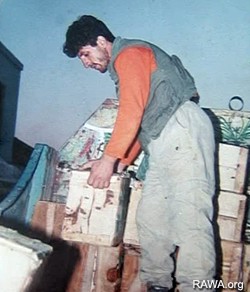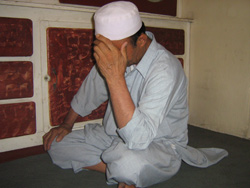Kim Barker
Faced with skyrocketing food prices and no job, Mohammad Daud decided he had suffered enough. The 27-year-old swallowed 100 sleeping pills and died.

Mohammad Daud, 27-year old boy who committed suicide
His decision late last month reflects panic in this war-torn country over the price of food, especially wheat, the staple of the Afghan diet. Afghanistan, landlocked and drought-ridden, depends on aid and food imports to survive, and the world's food crisis has hit hard.
"He became so disappointed, he killed himself," said Shuja Ullah, Daud's brother-in-law, who said Daud took care of his mother, his 11-year-old son and the four orphans of his two late brothers. "If he had food, why would he kill himself? He wouldn't. He could not afford to buy food for his family. Everyone felt so bad for him. But the government didn't."
Few countries have suffered from the global squeeze on food like Afghanistan, one of the world's poorest nations, where most of the agricultural land is devoted to poppies. While other countries also struggle with supply and demand, the crisis here is compounded by the Taliban-led insurgency and the drug trade.
Western officials — including officers with the NATO-led International Security Assistance Force — say the food crisis is potentially more destabilizing to the U.S.-backed government of President Hamid Karzai than the insurgency itself.
"It's serious," one ISAF official said who declined to be identified. "We're concerned. The concern would be that people do not have enough food and would blame the government. Insurgents take advantage of that."
Militants in the south are already blaming the government for failing to feed Afghans, officials said. Taliban-led insurgents also may exploit the crisis to divide Afghans from the government when government employees such as the police take bribes to add to their paltry wages. The Taliban also could recruit Afghans who need the money to buy food.
"If we don't find a solution for this, of course there will be a gap between the government and people," said Mir Muhammad Amin Farhang, the Afghan minister of commerce and industries. "And this distance will grow. Of course the terrorists and insurgents will create distrust. They will use this situation as much as possible."
Afghanistan is experiencing a food crisis largely because its one-time suppliers have banned exports or taxed them. Neighboring Pakistan and nearby Kazakhstan, which together once supplied much of Afghanistan's wheat, have banned most exports to feed their own people. Iran has taxed wheat exports.
Flour prices in Afghanistan have tripled since 2007. The cost of 220 pounds of flour —enough to feed Daud's family for a month—has risen to about $88. That's almost four times what it would cost in Pakistan. Most Afghan government employees earn about $100 a month.
From bad to worse

Sayed Ali told IRIN News that he had to sell his daughter to save the rest of his family from starvation.
Up to 18 million people in Afghanistan live on less than US$2 a day and are considered food-insecure, FAO says
Across Afghanistan, the tragic stories are mounting. Teachers at one high school in Kabul who made about $80 a month went on strike in May, complaining that they were expected to teach the country's young but could afford to feed their children only boiled wheat. Some families in far-flung provinces have sold their children or tried to. In one case, Karzai intervened, ordering the governor of northern Kunduz province to help a family that had sold a child.
A young man from northwestern Jowzjan province hanged himself because he was starving, a TV station reported recently. In the eastern city of Jalalabad, protesters blocked the road to Kabul in April over food prices.
Because of the stiff controls in Pakistan, smugglers have been using donkeys and children to carry flour to Afghanistan. The situation is so dire that some Afghan farmers who grew poppies for opium and heroin have switched to wheat, to take advantage of the price increases, said Obaidullah Ramin, the minister of agriculture, adding that he considers the food crisis to be more serious than the poppy crisis.
In May, Karzai called several hundred farmers from across the country to Kabul and asked them to switch from poppies to wheat. But without further price increases, more irrigation and an easy way to get wheat to market, it's unlikely that enough farmers will switch to make a significant difference, Afghan officials said.
Although other commodity prices have increased—rice and beans have almost doubled in the past six months—bread is the core of the Afghan diet.
Bakeries that a few months ago sold a piece of bread for 12 cents have cut the portion almost in half and increased the price to 20 cents.
Many families have stopped eating bread. Because meat is out of range, meals often consist of potatoes or okra. Ali, 45, earns 60 cents to $1 a day selling grimy jewelry, rocks and shells.
"For dinner, we boiled one egg and split it between three people," said Ali, who like many Afghans has no last name. "There's no other option."
In January, the UN World Food Program and the Afghan government made an emergency plea to donor countries for $77 million for 89,000 tons of commodities, to help the 2.5 million poorest Afghans.
That was supposed to provide relief until July, when officials thought Afghanistan's harvest and imports from Pakistan would remove some of the pressure. But then Pakistan banned most exports. And the Afghan harvest is expected to be poor.
The government has scrambled for other temporary fixes. In April, officials decided to use $50 million to buy wheat and flour to resell at a fixed rate to government employees, the disabled and relatives of people killed in war. After international pressure, the Pakistani government will soon allow the export of about 55,000 tons of wheat to Afghanistan for emergency relief.
Those measures, officials agree, will reduce prices only slightly. To really solve the food crisis, the government will have to strengthen Afghan agriculture and start storing commodities.
International dependence
So far, the government's long-term plans depend on the international community. In May, the Ministry of Agriculture asked international donors for $100 million to help boost this year's harvest. At an upcoming donors conference in Paris, the government will ask for $4.5 billion for a master plan to help the country's agriculture sector.
Rick Corsino, head of the UN food program in Afghanistan, said he is "very pessimistic about the future." In 2007, the agency estimated that an Afghan family spent 60 percent of its income on food. Now that same family spends more than 75 percent.
Many Afghans said they miss the 1980s, when the hated Soviet occupation meant food stocks and fixed prices. They blame the Karzai government.
"This government does not care about people," said Ghulam Rasool, Daud's uncle, who has 10 dependents but no job. He said he knew what his dead nephew's family would do to survive. "They will have to go on the street and beg. What else can they do?"



